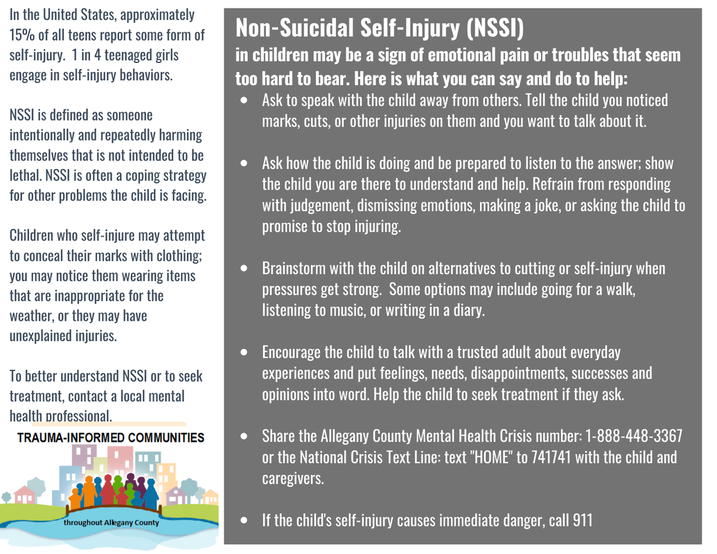- Home
- Trauma-Informed Education
- Trauma Overview
-
#onecaringadult
- #Onecaringadult Allegany County App
- #onecaringadult- Academic Stress
- #onecaringadult- Alcohol and Other Drugs
- #onecaringadult- Bullying
- #onecaringadult- LGBTQ+
- #onecaringadult- Childhood Neglect
- #onecaringadult- E-Cigarettes and Vaping
- #onecaringadult- Eating Disorders
- #onecaringadult- Mental Health
- #onecaringadult- Online Sexual Exploitation
- #onecaringadult- Non-Suicidal Self-Injury
- #onecaringadult- Sexual Abuse
- #onecaringadult- Sexually Transmitted Infections
- #onecaringadult- Suicide Prevention
- #onecaringadult- Teen Dating Violence
- #onecaringadult- Teen Pregnancy
- #onecaringadult- Toxic Stress
- #onecaringadult- Vaping & E-Cigarettes
- #onecaringfriend
- Trauma-Informed Resources
Non-Suicidal Self-Injury (NSSI) is the deliberate, self-inflicted destruction of body tissue resulting in immediate damage, without suicidal intent and for purposes not culturally sanctioned. It's typically not meant as a suicide attempt. Rather, this type of self-injury is a harmful way to cope with emotional pain, intense anger and frustration.
Self-injury can include a variety of behaviors but is most commonly associated with:
Self-injury can include a variety of behaviors but is most commonly associated with:
- intentional carving or cutting of the skin
- subdermal tissue scratching
- burning oneself
- banging or punching objects or oneself with the intention of hurting oneself
- embedding objects under the skin
WHAT YOU NEED TO KNOW ABOUT NON-SUICIDAL SELF-INJURY

|
Warning Signs of Non-Suicidal Self-Injury
Signs of self-injury may include:
|
Learn More About Self-Injury
|
|
Tips To Help Someone Who Self-Injures
|
Helpful Links
|
|
If you have a friend or loved one who is self-injuring, you may be shocked and scared. Take all talk of self-injury seriously. Although you might feel that you'd be betraying a confidence, self-injury is too big a problem to ignore or to deal with alone. Here are some ways to help.
|
Cornell Research Program on Self-Injury and Recovery
American Psychological Association (APA) article: “Who Self-Injures?” Mental Health America (MHA) information about Self-Injury National Alliance on Mental Illness (NAMI) Self-Harm Fact Sheet Nip in the Bud website, and Understanding Self-Harm Fact Sheet and Link to Film Self- Injury Outreach and Support (SiOS): General Information A Guide for Parents |
- Home
- Trauma-Informed Education
- Trauma Overview
-
#onecaringadult
- #Onecaringadult Allegany County App
- #onecaringadult- Academic Stress
- #onecaringadult- Alcohol and Other Drugs
- #onecaringadult- Bullying
- #onecaringadult- LGBTQ+
- #onecaringadult- Childhood Neglect
- #onecaringadult- E-Cigarettes and Vaping
- #onecaringadult- Eating Disorders
- #onecaringadult- Mental Health
- #onecaringadult- Online Sexual Exploitation
- #onecaringadult- Non-Suicidal Self-Injury
- #onecaringadult- Sexual Abuse
- #onecaringadult- Sexually Transmitted Infections
- #onecaringadult- Suicide Prevention
- #onecaringadult- Teen Dating Violence
- #onecaringadult- Teen Pregnancy
- #onecaringadult- Toxic Stress
- #onecaringadult- Vaping & E-Cigarettes
- #onecaringfriend
- Trauma-Informed Resources